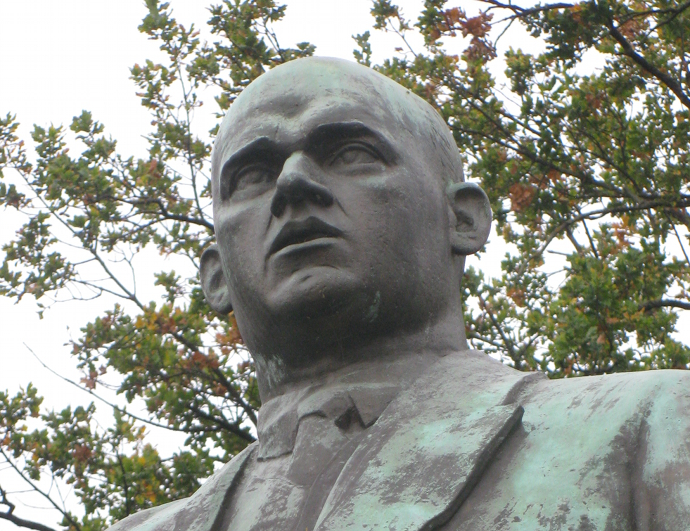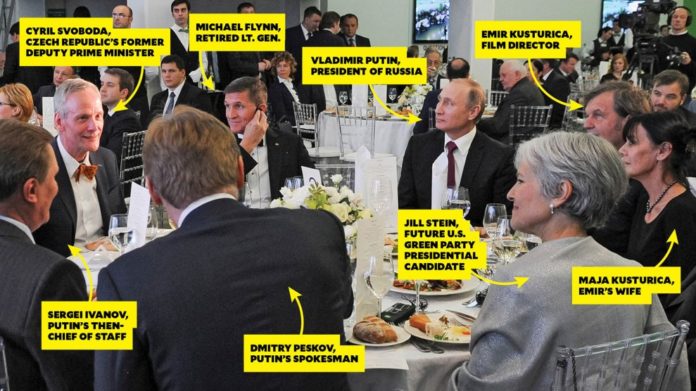Nowhere this year, for one thing because they made asses of themselves last time.
Green politics to debate and reject
by Michael Kinnucan – from his Facebook page
I’m really glad that some people in DSA are pushing a debate over whether we should endorse Howie Hawkins. That’s a great debate to have. The kind of self-marginalizing, moralistic, inward-looking symbolic politics the Green Party represents – the rejection of strategic thinking as a betrayal of principle, the refusal to acknowledge any responsibility for shaping political outcomes, the smug certainty that pursuing the same failed strategy over and over and over again is a mark of exceptional virtue rather than intellectual bankruptcy – all this is endemic on the left, endemic in the technical sense of the term, a disease that will always threaten the left and especially at moments of defeat, because it is, after all, a kind of despair. So it’s extremely healthy for the left to debate and reject this kind of politics as often as possible, to make it crystal clear that a strong and growing organization like DSA absolutely refuses to follow the Green Party down its road to failure.
As a contribution to that debate, let me note that:
1) The Green Party has been pursuing the same strategy of symbolic presidential runs for decades with no visible result–no growth in vote total, no effect on the national conversation, no leverage to push the Democrats left, just nothing. AOC did more for the left by winning a few thousand votes in a congressional race than the Green Party has in its entire existence.
2) The Green Party not only hasn’t grown, it simply can’t grow. If the Greens ever really had a banner year and managed to get all the way up to, say, 3% of the presidential vote, it would become crystal clear to everyone that the Green Party had caused a Republican presidency, and its vote total would crash back down. The Green Party leadership may believe with perfect equanimity that Trump is exactly the same as a Democrat (or that even considering who might win a presidential election when one votes in a presidential election is a dirty compromise), but its voters don’t; there’s a good reason that the Greens have never surpassed their 2.7% “victory” in 2000, and it’s the same reason that polls show support for the Greens cratering this year from an already extremely low 2016 result: very few left-wing voters really want a Republican to be elected president.
3) Many people blame the Green Party’s comprehensive failure at every level on a US electoral system biased against third parties, but this is too kind to the party. The Vermont Progressive Party has been building power in that state for decades, after all, and has even won statewide office. The Greens’ failure to achieve anything remotely like this level of success anywhere in the country is no doubt in part due to simple incompetence, but the deeper problem is its choice to run presidential candidates and create a spoiler dynamic that makes it toxically unpopular with virtually everyone who shares its politics. The supposed justifications of this foolish strategy (that it preserves ballot access, that it might someday net the party some matching funds) collapse on the most cursory examination; the truth is that a moral commitment to vanity presidential campaigns that help Republicans is at the heart of the party’s identity.
4) Where does this identity come from? The odd thing about the Green Party is that it embodies a perspective on the US political system whose naivete and idealism is unmatched outside middle school civics textbooks. Many of us on the left remember a time when we ourselves were young enough to believe that the US political system was a forum in which voters expressed their unmediated individual preferences, etc.; most of us grow out of it and come to recognize that the electoral system is a terrain of struggle shaped by larger social forces. Some of us continue to engage with it on those terms and attempt to move the ball forward despite the obstacles; others decide that it is not an effective site of struggle at this historical moment and go do other kinds of organizing work. Not the Greens! They just keep doing the same unworkable thing, and regard a serious strategic assessment of the terrain as a terrible compromise on principle.
5) While I have been harsh on the Green Party so far, I must say that in Howie Hawkins they have found their perfect standard-bearer. Hawkins has spent the past two decades continuously losing elections. In 2017, after decades in Syracuse politics, he ran for mayor of Syracuse (population 140,000, a fourth of the size of a Congressional district) and got a grand total of 4% of the vote. That’s, yes, one thousand votes – the very same year that Jabari Brisport ran for New York City Council as a first-time candidate (every district is larger than Syracuse) and got 30% of the vote, 9,000 votes. Let me be clear: Winning as a third-party candidate is hard, but it’s not impossible. A serious candidate with an organizing mindset really can win. Bernie Sanders won, all those years ago in Burlington. But Hawkins isn’t a serious candidate; he isn’t really trying. He’s pretending to run for office, again and again and again, in order to make some obscure point that is clearly lost on the overwhelming majority of the electorate, as well it might be.
6) Did you know that the Green Party doesn’t control a *single* state legislative seat, anywhere in the country? There are thousands of such seats, most of them tiny, but none tiny enough for the Green Party’s organizing skills. Instead they’re gonna run for president, again.
7) If you’re serious about building a third party in the USA, there are a lot of ways to begin advancing that project–building a social base and local power, developing tactics and strategy, etc. There are a lot of examples to learn from, from the Nonpartisan League and the Populists to Kshama Sawant to the VPP. The Green Party isn’t among them. It isn’t a step in the right direction, or any direction. If you wanted to start a third party in the US right now the first thing you’d need to say is “we’re definitely NOT like the Greens.”
Every minute and every dollar spent advancing the Green Party project is a minute and dollar wasted. The left can’t afford this waste. Polls indicate that the Greens’ vote total is likely to crater this year, perhaps because voters don’t share their analysis that it’s cool if Trump wins; that’s all to the good, because the seas are rising quickly and the left can’t afford this crap.

Comrade Thälmann’s tale has a lesson for some US voters this year. Back in the 1920s and 1930s, Ernst Thälmann led the German communists. He and they had reasons to hate the social democrats and the liberals. In the chaos after World War I, members of those parties had a hand in the deaths of prominent communists. In the crash of Germany’s economy, the liberals and socialists rescued the corporations and left the middle class and working people to fend for themselves. And as Hitler began his rise to power, Thälmann was calling the social democats and liberals “social fascists.” The nazi threat grew until there came a time when they had just over one-third of the vote. If communists joined forces in the Reichstag with social democrats and liberals, the votes were there to stop Hitler. Comrade Thälmann wouldn’t do it. Hitler came to power. Thälmann died at the Buchenwald concentration camp.
Contact us by email at fund4thepanamanews@gmail.com
To fend off hackers, organized trolls and other online vandalism, our website comments feature is switched off. Instead, come to our Facebook page to join in the discussion.
These links are interactive — click on the boxes












